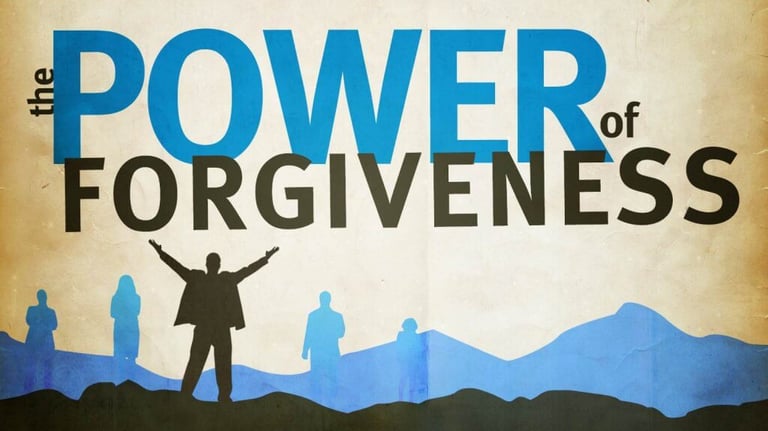The Healing Power of Forgiveness, A Journey to Understanding the Biblical Perspective
Forgiveness is a concept central to the Christian faith and a cornerstone of emotional and spiritual healing. The act of forgiveness, both given and received, holds transformative power that can mend relationships, restore peace, and draw us closer to God. Yet, forgiveness can also be one of the most challenging commands to follow, especially when the wounds inflicted are deep. This article explores the healing power of forgiveness through a biblical lens, offering insight into its profound significance and practical application in our lives.
Forgiveness in the Bible, A Divine Command
The Bible underscores forgiveness as a divine mandate, not merely a suggestion. In the Lord's Prayer, Jesus teaches us to pray, saying, "Forgive us our debts, as we also have forgiven our debtors" (Matthew 6:12). This powerful prayer emphasizes that forgiveness is a gift we receive from God and an obligation we extend to others.
Forgiveness is not just about letting go of anger but about reflecting God’s character. Ephesians 4:32 reminds us, "Be kind and compassionate to one another, forgiving each other, just as in Christ God forgave you." This verse links our forgiveness of others to our immeasurable forgiveness through Christ's sacrifice on the cross.
The Healing Power of Forgiveness
Restoring Our Relationship with God
Unforgiveness creates a barrier between us and God. Our spiritual connection with God can become strained when we harbor resentment, bitterness, or anger. In Matthew 6:14-15, Jesus warns, "For if you forgive other people when they sin against you, your heavenly Father will also forgive you. But if you do not forgive others their sins, your Father will not forgive your sins."
God's forgiveness toward us is not contingent upon our forgiving others but reflects our transformed hearts. By forgiving others, we align ourselves with God’s will, allowing His grace to flow freely in our lives and restoring our fellowship with Him.
Healing Emotional Wounds
Forgiveness is a powerful antidote to emotional pain. Holding onto anger and bitterness often harms us more than the one who wronged us. Studies have shown that unforgiveness can lead to stress, anxiety, and even physical health issues.
The Bible acknowledges this truth in Proverbs 17:22: "A cheerful heart is a good medicine, but a crushed spirit dries up the bones." Choosing to forgive can release us from the heavy burden of negative emotions, replacing them with peace and joy.
Breaking the Chains of Bitterness
Unforgiveness keeps us tethered to the past, replaying painful memories and holding us captive to bitterness. Hebrews 12:15 warns, "See to it that no one falls short of the grace of God and that no bitter root grows up to cause trouble and defile many."
Forgiveness allows us to break free from these chains. It doesn’t mean forgetting the wrong or excusing the behavior, but it does mean releasing the offender from the debt they owe us. This act of grace liberates us, enabling us to move forward unencumbered.
The Process of Forgiveness
Forgiveness is a journey, not a one-time event. It often requires intentional effort, prayer, and reliance on God. Here are steps, grounded in biblical wisdom, to help navigate this journey:
Acknowledge the Hurt
The first step in forgiveness is recognizing the pain caused. Psalm 34:18 assures us, "The Lord is close to the brokenhearted and saves those who are crushed in spirit." Bring your pain to God, acknowledging the depth of your hurt and seeking His comfort.
Pray for Strength
Forgiveness requires supernatural strength, especially when the offense feels unforgivable. Philippians 4:13 reminds us, "I can do all this through him who gives me strength." Pray for God to soften your heart and empower you to forgive.
Release the Offender
Romans 12:19 urges us, "Do not take revenge, my dear friends, but leave room for God’s wrath, for it is written: 'It is mine to avenge; I will repay,' says the Lord." Forgiveness involves surrendering the offender to God, trusting Him to bring justice in His perfect timing.
Choose Love
Forgiveness is an act of love. In Matthew 5:44, Jesus instructs, "But I tell you, love your enemies and pray for those who persecute you." Choosing to forgive is choosing to act in love, even when it’s undeserved.
The Ultimate Example of Forgiveness
The ultimate model of forgiveness is found in Jesus Christ. As He hung on the cross, suffering for sins He did not commit, He uttered these powerful words: "Father, forgive them, for they do not know what they are doing" (Luke 23:34). Jesus forgave His executioners, demonstrating the boundless grace and mercy of God.
This example sets the standard for us. No matter how deeply we’ve been wronged, we are called to extend the same grace and mercy that we’ve received.
Forgiving Yourself
While forgiving others is often the focus, forgiving ourselves is equally important. Many people struggle with guilt and self-condemnation for past mistakes, feeling unworthy of God’s love and grace. However, Romans 8:1 offers assurance: "Therefore, there is now no condemnation for those who are in Christ Jesus."
God’s forgiveness is complete and unconditional. If He has forgiven us, we must learn to accept that forgiveness and release ourselves from the chains of guilt.
The Ripple Effect of Forgiveness
Forgiveness has a ripple effect that extends far beyond the individual. When we forgive, we become agents of God’s peace, spreading His love and grace to others. Colossians 3:13 urges, "Bear with each other and forgive one another if any of you has a grievance against someone. Forgive as the Lord forgave you."
By forgiving, we create an atmosphere of grace that can transform families, communities, and even nations. Forgiveness paves the way for reconciliation, unity, and healing on a grand scale.
Practical Tips for Living a Life of Forgiveness
Meditate on Scripture: Regularly read and meditate on Bible verses about forgiveness to remind yourself of God’s truth.
Practice Gratitude: Focus on the forgiveness you’ve received from God and others, cultivating a heart of gratitude.
Seek Support: Share your struggles with a trusted friend, pastor, or counselor who can provide biblical guidance.
Pray Continually: Make forgiveness a consistent part of your prayer life, asking God to help you forgive and be forgiven.
Forgiveness as Freedom
Forgiveness is not a sign of weakness but a testament to the transformative power of God’s love in our lives. It liberates us from the chains of bitterness, restores our relationship with God, and enables emotional healing. By choosing to forgive, we mirror God's heart and open the door to peace, joy, and spiritual growth.
Let us strive to embrace forgiveness as a way of life, following Christ's example and extending grace to others as we have received it. As Colossians 3:15 encourages, "Let the peace of Christ rule in your hearts, since as members of one body you were called to peace. And be thankful."
Forgiveness is not just a gift we give to others; it is a gift we give ourselves—a pathway to healing, freedom, and the abundant life God desires. May we walk this journey with courage, faith, and love, knowing that all things are possible with God.
Reflection: Who do you need to forgive today? Take a moment to pray, asking God to guide you on this journey of healing and grace. Let forgiveness transform your heart and life, as only God can.


This Page contains affiliate links
